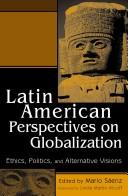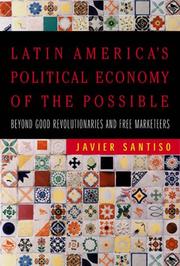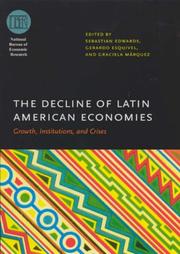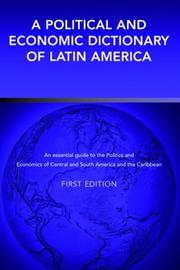| Listing 1 - 10 of 179 | << page >> |
Sort by
|

ISBN: 0742507769 0742507777 146163864X 9781461638643 9780742507760 9780742507777 Year: 2002 Publisher: Lanham: Rowman & Littlefield,
Abstract | Keywords | Export | Availability | Bookmark
 Loading...
Loading...Choose an application
- Reference Manager
- EndNote
- RefWorks (Direct export to RefWorks)
From the most prominent thinkers in Latin American philosophy, literature, politics, and social science comes a challenge to conventional theories of globalization. The contributors to this volume imagine a discourse in which revolution requires no temporalized march of progress or takeovers of state power but instead aims at local control and the material conditions for human dignity.
Globalization. --- Latin America --- Foreign relations. --- Politics and government --- Global cities --- Globalisation --- Internationalization --- International relations --- Anti-globalization movement --- Latin America - Foreign relations. --- Latin America - Politics and government - 1980 --- -Globalization.
Book
ISBN: 9780521114950 9780521132664 9780511750311 9780511749551 0511749554 0511750315 0511743017 9780511743016 0521114950 0521132665 110720304X 1282631500 9786612631504 0511748817 0511741944 0511744099 Year: 2010 Publisher: Cambridge: Cambridge university press,
Abstract | Keywords | Export | Availability | Bookmark
 Loading...
Loading...Choose an application
- Reference Manager
- EndNote
- RefWorks (Direct export to RefWorks)
Political parties provide a crucial link between voters and politicians. This link takes a variety of forms in democratic regimes, from the organization of political machines built around clientelistic networks to the establishment of sophisticated programmatic parties. Latin American Party Systems provides a novel theoretical argument to account for differences in the degree to which political party systems in the region were programmatically structured at the end of the twentieth century. Based on a diverse array of indicators and surveys of party legislators and public opinion, the book argues that learning and adaptation through fundamental policy innovations are the main mechanisms by which politicians build programmatic parties. Marshalling extensive evidence, the book's analysis shows the limits of alternative explanations and substantiates a sanguine view of programmatic competition, nevertheless recognizing that this form of party system organization is far from ubiquitous and enduring in Latin America.
Book
ISBN: 3319940570 3319940562 3030067866 Year: 2019 Publisher: Cham : Springer International Publishing : Imprint: Springer,
Abstract | Keywords | Export | Availability | Bookmark
 Loading...
Loading...Choose an application
- Reference Manager
- EndNote
- RefWorks (Direct export to RefWorks)
This book is the newest and one of the very few existing examinations of the full nature of corruption throughout Central and South America. In detailed chapters written by experts with extensive in-country experience, it reveals the political and economic roots and consequences of corruption in Argentina, Bolivia, Brazil, Colombia, Guatemala, Honduras, Mexico, and Peru. The editor’s introduction and conclusion texts synthesize their work and provides an over-arching view of corrupt practices and anti-corruption initiatives throughout Latin America. Corruption in Latin America shows the extent to which corrupt practices engulf each of the countries discussed, the involvement of political and corporate entities in the pursuit of ill-gotten gains, and the drag on development caused by corruption in each political entity. The book will be of interest for social scientists, political actors and social activists involved in the fight against corruption in Latin America by providing in depth analyses of the topic and discussing how best to pursue anti-corruption efforts through civil society actions, judicial endeavors, legal shifts, or elections.
Book
ISBN: 3030212327 3030212335 Year: 2020 Publisher: Cham : Springer International Publishing : Imprint: Palgrave Macmillan,
Abstract | Keywords | Export | Availability | Bookmark
 Loading...
Loading...Choose an application
- Reference Manager
- EndNote
- RefWorks (Direct export to RefWorks)
This book’s leading goal is to explain why some states in the Americas have been markedly more effective than others at forming stable democratic regimes. The six states analyzed are the United States, Mexico, Colombia, Venezuela, Costa Rica, and Guatemala. The study identifies the critical challenges each state encountered at different stages of its state-creation and regime- formation processes, from the colonial period to the present. In its concluding chapter, the study presents a series of time-related hypotheses designed to capture the different evolutionary processes and explain variances in success. Alex Roberto Hybel is the Susan Eckert Lynch Emeritus Professor of Government and International Relations at Connecticut College, USA.
Comparative politics. --- Democracy. --- Latin America-Politics and gover. --- Comparative Politics. --- Latin American Politics. --- Self-government --- Political science --- Equality --- Representative government and representation --- Republics --- Comparative political systems --- Comparative politics --- Government, Comparative --- Political systems, Comparative --- Latin America—Politics and government.
Book
ISBN: 0804786445 9780804786447 9780804784528 0804784523 9780804784535 0804784531 Year: 2013 Publisher: Stanford (Calif.): Stanford university press,
Abstract | Keywords | Export | Availability | Bookmark
 Loading...
Loading...Choose an application
- Reference Manager
- EndNote
- RefWorks (Direct export to RefWorks)
In the 1980's and 1990's, neoliberal forms of governance largely dominated Latin American political and social life. Neoliberalism, Interrupted examines the recent and diverse proliferation of responses to neoliberalism's hegemony. In so doing, this vanguard collection of case studies undermines the conventional dichotomies used to understand transformation in this region, such as neoliberalism vs. socialism, right vs. left, indigenous vs. mestizo, and national vs. transnational. Deploying both ethnographic research and more synthetic reflections on meaning, consequence, and possibility, the essays focus on the ways in which a range of unresolved contradictions interconnect various projects for change and resistance to change in Latin America. Useful to students and scholars across disciplines, this groundbreaking volume reorients how sociopolitical change has been understood and practiced in Latin America. It also carries important lessons for other parts of the world with similar histories and structural conditions.
Neoliberalism --- Social change --- Latin America --- Politics and government --- Social conditions --- Economic policy. --- Economic policy --- Neoliberalism - Latin America --- Social change - Latin America --- Latin America - Politics and government - 1980 --- -Latin America - Social conditions - 1982 --- -Latin America - Economic policy
Book
ISBN: 303062305X 3030623041 Year: 2020 Publisher: Cham, Switzerland : Palgrave Macmillan,
Abstract | Keywords | Export | Availability | Bookmark
 Loading...
Loading...Choose an application
- Reference Manager
- EndNote
- RefWorks (Direct export to RefWorks)
This book provides the first English translation of Argirópolis (1850) by the Argentine Domingo F. Sarmiento, one of the most important political and cultural figures of nineteenth-century Latin America. Argirópolis proposes the union of Argentina, Paraguay, and Uruguay into the United States of South America or the United States of the Río de la Plata, with a capital on Martín García island. It anticipates some aspects of the continent’s future, such as the formation of Mercosur (the Southern Common Market) in 1991. Argirópolis explores politics, modernity, and nation formation, making Sarmiento’s treatise one of Argentina and Latin America’s most relevant programmatic texts. Presented alongside a critical introduction that situates the essay in its historical and political contexts, this translation allows English-speaking readers to explore nineteenth-century Latin American perspectives on concepts such as the nation-state, sovereignty, progress, space, and modernity.
Latin America—History. --- World politics. --- Latin America—Politics and government. --- Latin American History. --- Political History. --- Latin American Politics. --- Colonialism --- Global politics --- International politics --- Political history --- Political science --- World history --- Eastern question --- Geopolitics --- International organization --- International relations --- Argentina --- Politics and government

ISBN: 0262195429 9786612096914 0262283026 1282096915 1423774515 9780262283021 9781423774518 9780262195423 9781282096912 6612096918 Year: 2006 Publisher: Cambridge: MIT Press,
Abstract | Keywords | Export | Availability | Bookmark
 Loading...
Loading...Choose an application
- Reference Manager
- EndNote
- RefWorks (Direct export to RefWorks)
Annotation
Economic policy and planning (general) --- Government --- Political systems --- Latin America --- Amérique latine --- Economic policy. --- Politics and government --- Politique économique --- Politique et gouvernement --- Economic policy --- 330.98 --- Asociación Latinoamericana de Libre Comercio countries --- Neotropical region --- Neotropics --- New World tropics --- Spanish America --- -Politics and government --- Latin America -- Economic policy. --- Latin America -- Politics and government -- 1980-. --- Amérique latine --- Politique économique --- ECONOMICS/Political Economy --- Latin America - Economic policy --- Latin America - Politics and government - 1980 --- -Latin America

ISBN: 0226185001 9786612004834 1282004832 0226185036 9780226185033 9780226185002 Year: 2007 Publisher: Chicago University of Chicago Press
Abstract | Keywords | Export | Availability | Bookmark
 Loading...
Loading...Choose an application
- Reference Manager
- EndNote
- RefWorks (Direct export to RefWorks)
Latin America's economic performance is mediocre at best, despite abundant natural resources and flourishing neighbors to the north. The perplexing question of how some of the wealthiest nations in the world in the nineteenth century are now the most crisis-prone has long puzzled economists and historians. The Decline of Latin American Economies examines the reality behind the struggling economies of Argentina, Chile, and Mexico. A distinguished panel of experts argues here that slow growth, rampant protectionism, and rising inflation plagued Latin America for
Latin America - Economic conditions. --- Latin America -- Economic conditions. --- Latin America - Economic policy. --- Latin America -- Economic policy. --- Latin America - History. --- Latin America -- History. --- Latin America - Politics and government. --- Latin America -- Politics and government. --- Business & Economics --- Economic History --- Latin America --- Economic conditions --- Economic policy --- Politics and government --- Asociación Latinoamericana de Libre Comercio countries --- Neotropical region --- Neotropics --- New World tropics --- Spanish America --- Economic conditions. --- Economic policy. --- Politics and government. --- History. --- History --- E-books --- BUSINESS & ECONOMICS / General. --- latin america, mexico, argentina, chile, politics, government, history, economics, unrest, revolution, corruption, inflation, protectionism, growth, textiles, industry, nonfiction, stablization, foreign advisors, currency, lending, governance, solvency, risk, emerging markets, debt, inequality, wealth, poverty, portugal, taxation.
Book
ISBN: 3030010031 3030010023 Year: 2019 Publisher: Cham : Springer International Publishing : Imprint: Palgrave Pivot,
Abstract | Keywords | Export | Availability | Bookmark
 Loading...
Loading...Choose an application
- Reference Manager
- EndNote
- RefWorks (Direct export to RefWorks)
“In her illuminating and careful readings of Mexico This Month and Mexican Folkways, Claire Lindsay recuperates an important piece of Mexican and hemispheric American history. Magazines, Tourism, and Nation-Building in Mexico is an important and timely publication that will appeal to readers from across disciplinary fields.” —María del Pilar Blanco, Associate Professor, Spanish American Literature, University of Oxford, UK This open access book discusses the relationship between periodicals, tourism, and nation-building in Mexico. It enquires into how magazines, a staple form of the promotional apparatus of tourism since its inception, articulated an imaginative geography of Mexico at a time when that industry became a critical means of economic recovery and political stability after the Revolution. Notwithstanding their vogue, popularity, reach, and close affiliations to commerce and state over several decades, magazines have not received any sustained critical attention in the scholarship on that period. This book aims to redress that oversight. It argues that illustrated magazines like Mexican Folkways (1925–1937) and Mexico This Month (1955–1971) offer rich and compelling materials in that regard, not only as unique tools for interrogating the ramifications of tourism on the country’s reconstruction, but as autonomous objects of study that form a vital if complex part of Mexico’s visual culture. Claire Lindsay is Reader in Latin American Literature and Culture at University College London, UK. She is the author of Locating Latin American Women Writers and Contemporary Travel Writing of Latin America. .
Latin America-Politics and gover. --- Democracy. --- Ethnology-Latin America. --- Tourism. --- Latin American Politics. --- Latin American Culture. --- Tourism Management. --- Self-government --- Political science --- Equality --- Representative government and representation --- Republics --- Holiday industry --- Operators, Tour (Industry) --- Tour operators (Industry) --- Tourism --- Tourism industry --- Tourism operators (Industry) --- Tourist industry --- Tourist trade --- Tourist traffic --- Travel industry --- Visitor industry --- Service industries --- National tourism organizations --- Travel --- Economic aspects --- Ethnology --- Latin America --- Politics and government. --- Latin America—Politics and government. --- Ethnology—Latin America. --- Management. --- Administration --- Industrial relations --- Organization --- Latin America—Politics and government --- Democracy --- Ethnology—Latin America --- Management --- America --- Political science. --- Culture. --- American Politics. --- Political Science. --- Latin America.

ISBN: 128028045X 9786610280452 0203403789 9780203403785 9781857432114 1857432118 1857432118 1135355681 Year: 2004
Abstract | Keywords | Export | Availability | Bookmark
 Loading...
Loading...Choose an application
- Reference Manager
- EndNote
- RefWorks (Direct export to RefWorks)
Latin America, in the first decade of the 21st century, remains as exciting, interesting and unpredictable as ever. In 2004 Haiti, the first Latin American country to gain its independence, celebrated its second centenary. But although the structure and organization of government, politics, production, international relations and trade in the region are by now well established, important changes are under way, and the Latin American countries are becoming more important than ever before in world politics as abridge between the USA and the rest of the world.
Latin America--Politics and government--Dictionaries. --- Government - Central & South America --- Latin America --- Regions & Countries - Americas --- Government - Non-U.S. --- History & Archaeology --- Law, Politics & Government --- Politics and government --- Economic conditions --- Asociación Latinoamericana de Libre Comercio countries --- Neotropical region --- Neotropics --- New World tropics --- Spanish America --- 033.2 --- LAM / Latin America - Latijns Amerika - Amérique Latine --- Economische en sociale encyclopedieën --- Central America --- Dictionaries --- South America --- Caribbean Area
| Listing 1 - 10 of 179 | << page >> |
Sort by
|

 Search
Search Feedback
Feedback About UniCat
About UniCat  Help
Help News
News